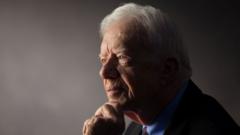Despite the passage of over four decades, the challenges confronting America today resonate with those from Jimmy Carter's era, from economic struggles to international conflicts. This article explores the parallels between Carter's presidency and the current administration under Joe Biden, emphasizing the lessons learned and obstacles remaining.
Echoes of History: Jimmy Carter's Legacy and Its Parallels with Biden's Presidency

Echoes of History: Jimmy Carter's Legacy and Its Parallels with Biden's Presidency
A reflection on the enduring challenges faced by former President Jimmy Carter and current President Joe Biden, highlighting the persistent political and social issues in America.
Former President Jimmy Carter passed away recently, with his life and presidency continuing to serve as a poignant lens through which to view the current political landscape in the United States. Forty-four years separate the end of Carter's term and his death—a long period that nonetheless serves as a stark reminder of the cyclical nature of the challenges America faces. Many issues that plagued the late 1970s have re-emerged, highlighting profound parallels in domestic and foreign policies.
During Carter's presidency, Americans were beset with a "crisis of confidence.” The nation grappled with economic strife and weakening global influence, issues reminiscent of the 2024 climate that President Biden navigates today. Key topics such as the economy, international relations with a focus on Russia, and conflicts in regions like Afghanistan and the Middle East emerge time and time again, underscoring a historical tendency toward repeating struggles.
Carter's diplomatic achievement was the Camp David Accords in 1978, which created a peace treaty between Egypt and Israel. However, these successes were overshadowed by the Iranian hostage crisis, demonstrating limitations in American power and confidence at that time. The timing of the release of hostages, coinciding with the dawn of Ronald Reagan's presidency, signified a low point for Carter, much like the impact of the chaotic exit from Afghanistan during Biden's administration, which ended two decades of U.S. involvement and destabilization.
In contemporary issues, President Biden faces the fallout from international crises, such as the surprise Hamas attack on Israel in October, which has exacerbated the ongoing humanitarian catastrophe in Gaza. While Biden initially rallied allies in response to Russia's invasion of Ukraine, the protracted nature of that conflict has put American moral resolve to the test. For both men, challenges from rising global powers and crises instigated by conflict are constant specters.
The legacy of both presidencies reveals additional disparities. Carter's peace efforts in the Middle East stalled over the unresolved Palestinian question, now further intensified by conflict and regional tensions. Similarly, Biden's approach struggles against Iranian ambitions and Israel's responses without clear, effective outcomes.
Moreover, both leaders contend with domestic ramifications stemming from their foreign policies. The environmental and energy crises were pivotal during Carter’s presidency, shaped by the oil embargo of the era. Fast forward to today, climate change looms large, with a focus on renewable energy being integral to Biden's policies—a legacy rooted in Carter’s vision.
While Carter faced skyrocketing inflation, today's economic climate under Biden has also seen tense rates of inflation with job market growth characteristics marking a note of difference. Nonetheless, public dissatisfaction and distrust of government remain enduring themes initiated during Carter's administration, where trust dropped significantly amidst economic turmoil.
Public opinion fluctuates, evidenced through comparisons drawn by opponents, particularly Donald Trump, who has leveraged Carter’s presidency as a foil to critique Biden. The polarized political atmosphere reflects a deep-seated skepticism in governance, an issue that neither leader has decisively abated.
In contrast, their post-presidential trajectories could not be more different. Carter’s legacy is defined by humanitarian efforts and advocacy for human rights following his presidency, including the esteemed Nobel Peace Prize recognition. Trump’s brief interregnum, on the other hand, has been consumed by combative politics and an eye on re-election, while Carter’s exit marked a commitment to social responsibility.
In summary, as America remembers Jimmy Carter, it also highlights the cyclical nature of political challenges, offering critical lessons on resilience and trust while drawing inevitable comparisons to Joe Biden's ongoing tenure. The landscape of American politics continues to ebb and flow, revealing both longstanding issues and new complexities that ultimately shape the national narrative.






















